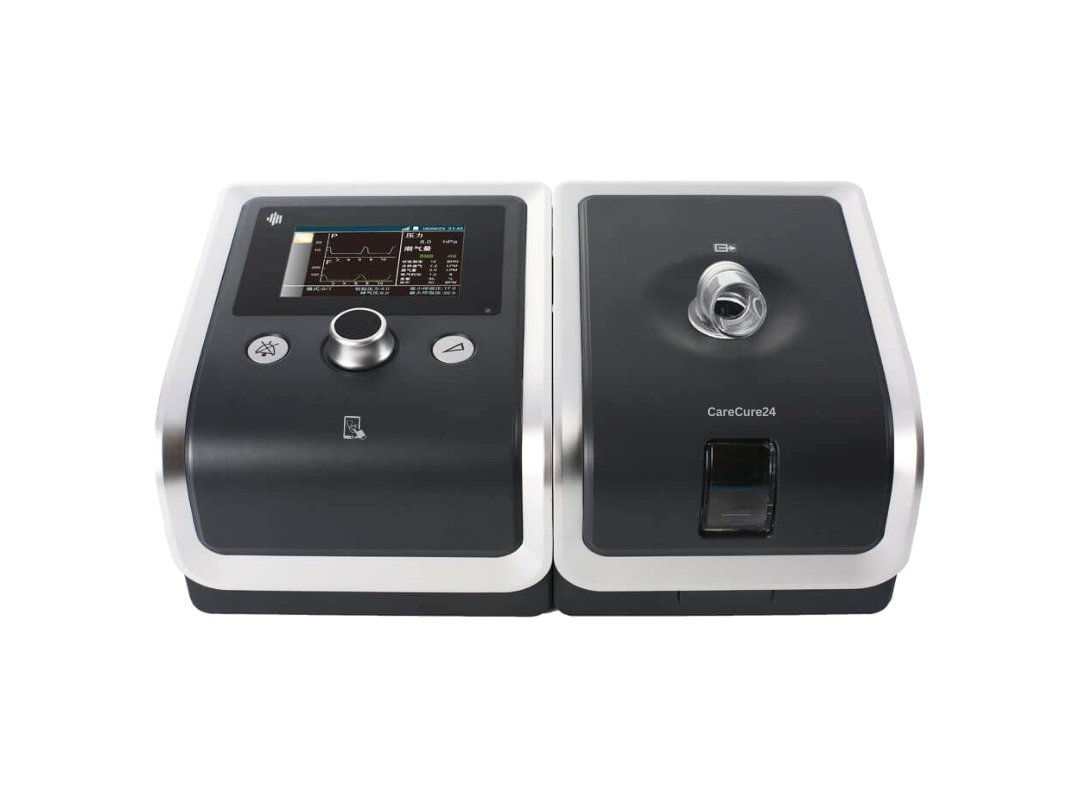A Bilevel Positive Airway Pressure machine is a non-invasive ventilator, also known as a BiPAP machine. It mainly helps to breathe easily of a respiratory patients.
If you or a family member has been diagnosed with sleep apnea, COPD, or another respiratory condition, your doctor may recommend a BiPAP machine.

This device plays an important role in improving the quality of sleep for patients, especially those who have difficulty breathing effectively.
The IPAP and EPAP inside the machine provide different levels of air pressure:
- IPAP: It provides higher pressure when the patient inhales.
- EPAP: It provides lower pressure when the patient exhales.
Working at these two levels makes BiPAP machines more comfortable for patients.
BiPAP machines are often used for breathing problems, including:
- Obstructive Sleep Apnea (OSA)
- Chronic Obstructive Pulmonary Disease (COPD)
- Central Sleep Apnea
- Congestive Heart Failure
- Obesity Hypoventilation Syndrome
How Does a BiPAP Machine Work?
A BiPAP machine uses a small, quiet motor to push pressurized air through a hose and into a mask worn over the nose or mouth. Unlike CPAP machines that provide constant air pressure, BiPAP machines adjust the pressure depending on whether you’re inhaling or exhaling.
This makes it easier to breathe out against the air pressure, especially for people with high-pressure settings or complex breathing issues.
Not only BIPAP, there are many other machines that are most necessary for respiratory problem patients.
Key Features of a BiPAP Machine:
- Two pressure settings (IPAP and EPAP)
- Gradually increases and decreases pressure for comfort
- Built-in humidifier to prevent dryness and irritation
- Data tracking system to monitor sleep patterns and performance
- Leak detection and alarm system for safety
BiPAP and CPAP difference?
While both BiPAP and CPAP machines help with sleep-related breathing disorders, there are key differences:
| Feature | CPAP Machine | BiPAP Machine |
|---|---|---|
| Air Pressure | Constant | Two levels (inhalation & exhalation) |
| Comfort Level | May feel restrictive | More natural breathing feel |
| Use Case | Mild to moderate OSA | Severe OSA, COPD, complex apnea |
| Price | Lower | Higher (but often insurance-covered) |
| Pressure Settings | Fixed or auto-adjusting (APAP) | Higher pressure on inhale (IPAP), lower on exhale (EPAP) |
| Complexity | Simple to use | More advanced, requires precise settings |
| More natural breathing feels | Common for sleep apnea | Also used for COPD, heart failure, and other conditions |
| Breath Detection | Not required | Detects patient breaths to adjust pressure accordingly |
If you find a CPAP machine uncomfortable or if it isn’t managing your symptoms effectively, this machine may offer a better alternative.
Benefits of BiPAP Machine
The benefits of BiPAP machines for people with breathing problems are many:
- Improved Breathing Support:
BiPAP machines help maintain open airways, reduce breathing effort, and increase oxygen levels. - Better Sleep Quality:
Many users report fewer interruptions during sleep and feel more refreshed in the morning. - Relief for COPD Patients:
For individuals with advanced lung disease, BiPAP therapy can reduce carbon dioxide levels and improve respiratory efficiency. - Comfortable and Customizable:
With dual pressure settings and mask options, BiPAP therapy can be tailored to individual comfort. - Reduced Hospital Visits:
Regular BiPAP use can help prevent respiratory complications, reducing the need for hospitalizations.
Is a BiPAP Machine Right for You?
Only a healthcare provider can determine if BiPAP therapy is appropriate for your condition. You may be a good candidate if:
- CPAP therapy is ineffective or uncomfortable
- You have trouble exhaling with CPAP
- You have a neuromuscular disorder, COPD, or other complex respiratory condition
- Your sleep study shows central sleep apnea
Always consult with a sleep specialist or pulmonologist before starting BiPAP therapy.
Cost of BiPAP machine
The cost of renting a BiPAP (Bilevel Positive Airway Pressure) machine can vary depending on its model, rental period, and location.
Some agencies may charge separately for accessories such as the machine’s mask, tubing, and humidifier.
The average monthly rental price can be between 6000 and 7000, with higher-end or newer machines costing more. Therefore, users rent it at a much lower cost than new ones.
Final Thoughts
A BiPAP machine can make a life-changing difference for people dealing with sleep apnea, COPD, and other respiratory disorders. By delivering targeted air pressure support, these machines help users breathe more comfortably, sleep more soundly, and live healthier lives.
If you’re struggling with breathing issues during sleep or have been told you need more than CPAP therapy, talk to your doctor about whether a BiPAP machine might be right for you.